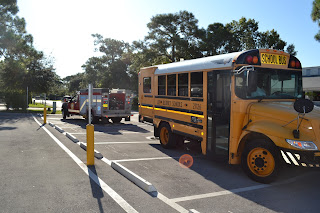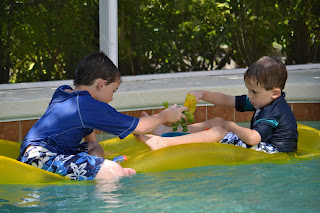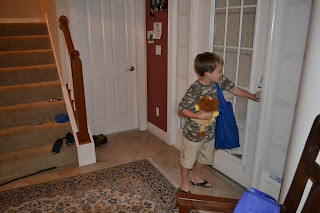My little cell phone sits beside me. I am ready to take Riley's next emergency. I can handle them. What bothers me is that Riley is on his own. Will the person beside him during his moment of need comfort him? Will he feel safe or will he be frightened. Sending him off to school is a comfort for me. He enjoys it, I can tell. He returns smiling. Yet, he is alone. More alone than any of us can understand.
Below is an article found on
www.sengifted.org. As I consider the education of both my special needs child and typically developing child, I am reminded to watch that both are being prepared for their future while enjoying their childhood. Their school education may be worlds apart but the goals are the same.
boating with Freedom Waters Foundation
http://southernboating.com/blog/category/editors-blog/
September Back-To-School Suggestions
By Wenda Sheard
SENG’s vision is a world where gifted, talented, and creative
individuals are supported to build gratifying, meaningful lives and
contribute to the well-being of others.
How can parents best support their gifted, talented, and
creative children at the beginning of the school year? I offer three
suggestions.
Teach Children Philosophies of Education
I suggest that parents discuss with their children the
purpose of education. Exposing young children to what great philosophers
have thought about education not only teaches children history,
philosophy, and education, but also helps them to create their own
educational goals—goals that may differ significantly from the goals of
other children.
When exploring what great philosophers have thought about education, children might notice three main purposes of education:
- Education serves the purpose of preparing children for
adult life, including preparing them to support themselves as adults.
Accordingly, the United States Department of Education’s stated mission
is: “to promote student achievement and preparation for global
competitiveness by fostering educational excellence and ensuring equal
access.”
- Some philosophers emphasize that education should
prepare children for good citizenship. Plato (circa 400 B.C.) and John
Locke (1632-1704) advocated virtue and good citizenship as the aims of
education. Plato wrote: “And we must remember further that we are
speaking of the education, not of a trainer, or of the captain of a
ship, but of a perfect citizen who knows how to rule and how to obey.”
Locke wrote: “Learning must be had, but in the second place, as
subservient only to greater qualities.”
- Education also serves the purpose of providing children
with an enjoyable childhood worth living and remembering fondly. John
Dewey (1859-1952) felt strongly that education should respect childhood:
“[The best teachers] give the pupils something to do, not something to
learn; and the doing is of such a nature as to demand thinking or the
intentional noting of connections; learning naturally results.” Maria
Montessori (1870-1952) similarly advocated happy childhoods: “Education
is not something which the teacher does ... it is a natural process
which develops spontaneously in the human being.”
Once children understand the purposes of education, they have
tools to articulate whether, and how, their own educations meet those
purposes or might be tweaked to meet those purposes. Sometimes the only
tweaking necessary is a change of perspective—perhaps a child will
understand that even if school currently is not sufficiently rigorous in
the “heading to adult life” sense. Perhaps the child can find ways to
enjoy childhood until rigor appears or reappears. Or, better yet,
perhaps the child can find ways to introduce rigor into his or her own
education. Child-introduced rigor might include education that will lead
to employment and/or good citizenship in future years. Some children
spend time excelling in computer programming, gaining marketable skills
at a young age. Other children spend time volunteering in ways that make
a difference in the world, foster virtue in the child, and later
impress college admissions officers and employers.
Explain the Necessity of Knowledge, Communion, and Expression
Another way that parents might support their gifted,
talented, and creative children at the beginning of the school year is
by reading P. Susan Jackson’s article "Bright Star - Black Sky: A
Phenomenological Study of Depression as a Window into the Psyche of the
Gifted Adolescent (see the end of this column for the online link). I
recommend that parents read the article first before deciding whether,
when, and how to share the article’s excellent insights with their
children.
In the article, Jackson explains that gifted teens have an
absolute need for knowledge of themselves and of physical and spiritual
phenomena, for strong emotional or spiritual communion with others, and
for expression of their emotions and feelings. Reading the article at
the beginning of each school year might help parents and children (if
sufficiently mature) to understand that beginning a school year is not a
simple matter; each school year presents new opportunities and
challenges for finding the knowledge, communion, and expression that
Jackson found critical to the lives of gifted teens.
During the first weeks of the school year, parents and
children can consider how the school year will affect all aspects of
each child’s life. Will the child have sufficient opportunities for
knowledge and for self-knowledge? Will the child have time at school or
elsewhere to interact with true peers, not just age-mates? Will the
child have time and methods to express emotions and feelings? Parents
and children should consider finding non-school times to fill whatever
gaps might exist in a given child’s school hours.
Offer Social and Emotional Hints
Most parents understand that the acquisition of knowledge is a
small part of any school experience. Most teachers are keenly aware
that the school day involves not just knowledge, but also social times
and emotional events. In this last section, I offer three hints that
parents might offer their gifted, talented, and creative children at the
beginning of a new school year.
The first hint comes from Benjamin Franklin, who realized
that by asking someone a favor, you endear yourself to that person.
Counterintuitive, yes, but it works! I suggest that you and your child
research what’s known as the Benjamin Franklin Effect. Your child might
then decide to try out Franklin’s idea at school as a way to build
friendship and respect.
Another friendship-building hint that I have shared over the
years with new students is to look around the room and find students who
look lonely. Then, with a smile on your face, go up to each of those
children, ask them about themselves, and listen well. Smiling is a
fantastic way to gain friends. Helping others who look lonely is an
excellent way to exhibit and to build a generous spirit. Asking people
about themselves and listening carefully to their answers is a social
skill that even many adults could improve.
Sometimes a gifted, talented, and creative child will spend a
school year without true peers in school. When this happens, parents
can share yet another hint—encourage the child to approach the school
year with the lens of an anthropologist.
Yes, that’s right—teach the child about the field of
anthropology and engage the child in studying the culture of the school.
Learning about anthropology and applying an anthropological lens, at
the child's level of understanding, to the school experience will help
the gifted child learn about and reflect a great deal on people, social
structures, and child development. Parents who spend the time necessary
to guide their budding anthropologist will benefit from increased and
honest communication that might lead to better understanding of the
child’s school experience.
Conclusion
For more hints and suggestions, I recommend the book A
Parent's Guide to Gifted Children (Great Potential Press, 2007). That
book, which is the core of the SENG Model Parenting Groups, well
explains the nature and nurture of gifted, talented, and creative
children.
If there is a SENG Model Parenting Group starting in your
area, I highly recommend that you join the group. If no groups are
currently available in your area, I recommend you consider being trained
as a SENG facilitator. The next SENG Model Parenting Group Facilitator
Training will be October 7-8, 2011, in Charlotte, North Carolina.
Wenda Sheard, J.D., Ph.D. is an emeritus board member and
past president of SENG. She currently teaches near London, England, and
serves as a trustee on the Council of Management of the UK's National
Association for Gifted Children.
References





























